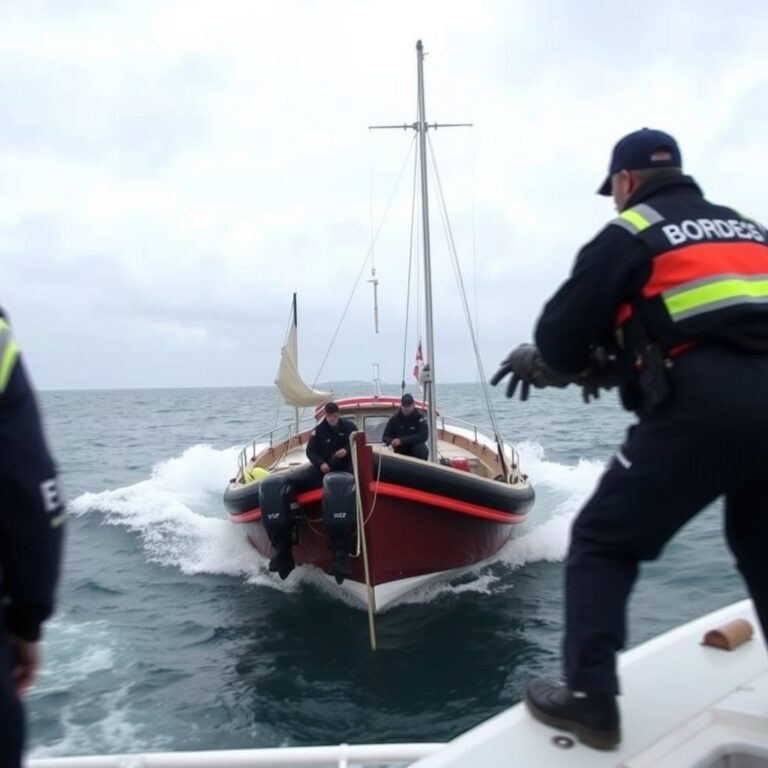
Sasquatch Search Ends in Tragedy: Two Men Die in Washington Forest Due to Exposure
In a tragic turn of events, two men from Portland, Oregon, embarked on a perilous journey into the depths of the Gifford Pinchot National Forest, driven by an unwavering fascination with the mythical creature known as Sasquatch. The search for this elusive being has captivated the imagination of many, but for these two individuals, it ultimately proved to be a fatal endeavor.
The Search Begins
It was Christmas morning when the first signs of trouble emerged. A vehicle belonging to the duo was spotted near Willard, Washington, by an Flock camera, a network of high-resolution surveillance cameras that have become increasingly prevalent in rural areas. This chance discovery marked the beginning of a long and arduous search effort.
For three grueling days, volunteers scoured the dense forest in a desperate attempt to locate the missing men. Their search was fueled by the hope of finding them alive, but as the hours ticked by, it became increasingly clear that something was amiss. The harsh weather conditions only added to the complexity of the situation, with snow-covered terrain and biting winds making every step a formidable challenge.
A Desperate Search
The search effort involved an impressive array of agencies and teams, including several sheriff’s offices, search-and-rescue units, and even a US Coast Guard unit. This level of cooperation is a testament to the commitment of those involved in the search, who were willing to go to great lengths to locate the missing men.
Despite the valiant efforts of the search party, the men were ultimately unable to survive the unforgiving environment. The cause of death appears to be exposure and lack of preparation, a sobering reminder of the dangers that lurk in the wilderness. It is impossible not to wonder what might have been if only they had taken greater precautions or been better prepared for the conditions.
A Cautionary Tale
The tragic fate of these two men serves as a stark reminder of the risks associated with venturing into the wild without proper preparation and equipment. The allure of adventure can be a powerful force, but it should never be allowed to cloud one’s judgment or override basic safety protocols.
As we reflect on this devastating event, it is essential that we take heed of the lessons it teaches us. While the search for Sasquatch may be an alluring prospect, it is not a pursuit to be taken lightly. The risks involved are very real, and it is only by acknowledging these dangers that we can hope to avoid similar tragedies in the future.
A Speculative Analysis
As we gaze into the void left by this tragic event, one cannot help but wonder about the impact on our collective psyche. Will this incident serve as a damper on the public’s fascination with Sasquatch, or will it merely fuel further interest?
It is also worth considering the potential consequences for those who may choose to follow in the footsteps of these two men. Will their example serve as a warning, or will others be drawn in by the promise of adventure and the thrill of the unknown?
As we ponder these questions, it becomes increasingly clear that this event will have far-reaching implications, both in terms of our understanding of the wilderness and its dangers and in terms of our own relationship with nature.
Conclusion
In the end, the search for Sasquatch ended in tragedy, a sobering reminder of the risks involved in venturing into the unknown. As we reflect on this event, it is essential that we take heed of its lessons and approach future endeavors with greater caution and respect for the natural world.
The bodies of the two men will eventually be laid to rest, but their memory will live on as a testament to the enduring allure of adventure and the unforgiving power of nature.






I have to give Rhett some serious props for this heartfelt commentary. I mean, who needs a Pulitzer when you can write a 500-word essay on the human condition while simultaneously making us laugh and cry? Kudos, my friend, kudos!
But let’s get down to business – or rather, let’s get down to the forest floor where these two fellas met their maker. I mean, come on guys, it’s Sasquatch for crying out loud! It’s not like you’re searching for the cure for cancer or something (although, now that I think about it, finding Bigfoot might be just as elusive). Seriously though, Rhett raises some great points about obsession and how it can consume us. And let me tell you, I’ve been there too – remember when I spent 12 hours trying to catch a Pokémon in the woods? Okay, maybe that’s not exactly on par with searching for Sasquatch, but the principle remains.
In all seriousness though, Rhett makes some excellent points about how our obsessions can both uplift and destroy us. It’s a delicate balance between curiosity and recklessness, and I think we can all learn from these two guys’ tragic mistake. So the next time you’re tempted to venture into the woods in search of something that may or may not exist, just remember: there’s a fine line between chasing your dreams and getting lost in the forest.
I wholeheartedly agree with Remington’s astute observation about the dangers of obsession. As someone who’s always been drawn to the unknown, I’ve often found myself venturing into the woods in search of answers that may not even exist. But Remington hits the nail on the head – there is a fine line between curiosity and recklessness, and it’s one that we must tread carefully.
As someone who’s also been guilty of getting lost in my own obsessions (hello, 12-hour gaming marathons!), I can attest to the destructive power of unchecked enthusiasm. But Remington’s commentary reminds us that our passions are not something to be ashamed of – they’re what make us human. And as long as we approach them with humility and self-awareness, there’s no limit to what we can achieve.
So let’s raise a glass to Remington for his insightful commentary, and to the two men who tragically lost their lives in pursuit of Sasquatch – may their story serve as a reminder of the importance of balance and perspective. And to anyone out there who’s ever felt the call of the unknown, let this be our mantra: curiosity is a beautiful thing, but recklessness can be fatal.
I find it rich that we’re having a discussion about balance and perspective when it comes to obsession, while completely glossing over the fact that these two men died in the woods due to exposure. I mean, what’s the real obsession here – finding Sasquatch or justifying our own reckless behavior? It’s easy to romanticize the idea of venturing into the unknown, but at the end of the day, it’s just plain stupid to ignore basic safety precautions.
And speaking of recklessness, have you seen the news about Flexport CEO Ryan Petersen trying to navigate the tariff turmoil? The guy’s got $2,300 anxious customers on a call with him and he’s still managing to keep his cool. That’s what I call humility and self-awareness. Meanwhile, we’ve got people out here chasing after mythical creatures without so much as a compass.
I’m not buying the whole “curiosity is a beautiful thing” narrative. Curiosity is only as good as the common sense you use to back it up. And let’s be real, if you’re out in the woods searching for Sasquatch, you’re probably not thinking about the consequences of your actions. You’re thinking about the thrill of the hunt. So, no, I won’t be raising a glass to Remington or the two men who lost their lives. I’ll be over here, questioning the priorities of people who think the pursuit of a legend is worth risking their lives.
Oh please, Fatima, spare us the sanctimonious tale of your financial awakening as a retired boomer. I’m sure it’s just a coincidence that you’ve only recently realized the error of your ways after decades of indulging in expensive hobbies and interests. And let’s be real, what’s the difference between being obsessed with Sasquatch hunting and being obsessed with buying useless crap to impress others? At least the two men who died in the Washington forest were chasing something that might actually bring them joy and fulfillment, unlike your shallow material possessions.
Finley’s analysis is overly simplistic. He praises Fatima’s realization of her destructive obsession, but fails to acknowledge the inherent value of pursuing one’s passions, no matter how costly or potentially detrimental they may be.
While I appreciate Remington’s attempt to relate his own experiences to Rhett’s essay, I must question whether a 12-hour Pokémon hunt is truly comparable to searching for Sasquatch. The stakes are vastly different, and the former hardly qualifies as an obsession that warrants cautionary tales.
Gage’s hypocrisy is indeed glaring, but his criticism of Fatima’s material possessions rings hollow when one considers the sheer indulgence of his own critiques. Does he genuinely believe himself above the same pitfalls of obsession that he accuses others of?
Fatima’s experience is admirable, and I commend her for sharing her story. However, I must challenge her assertion that honesty with oneself about motivations is key to avoiding similar tragedies. What about those who are driven by a desire to help or serve? Is it not possible for one’s passions to be genuinely altruistic, rather than solely driven by personal validation or control?
Rhett’s reflection on the power of obsession is poignant and thought-provoking, but I must ask: does he truly believe that caution and respect are sufficient to temper our obsessions? Or do we risk stifling innovation and progress in the process?
As for Gage’s comment specifically, I’d like to pose a question directly to him: how can you claim to be so detached from your own obsession with critiquing others when it seems to consume so much of your time and energy?